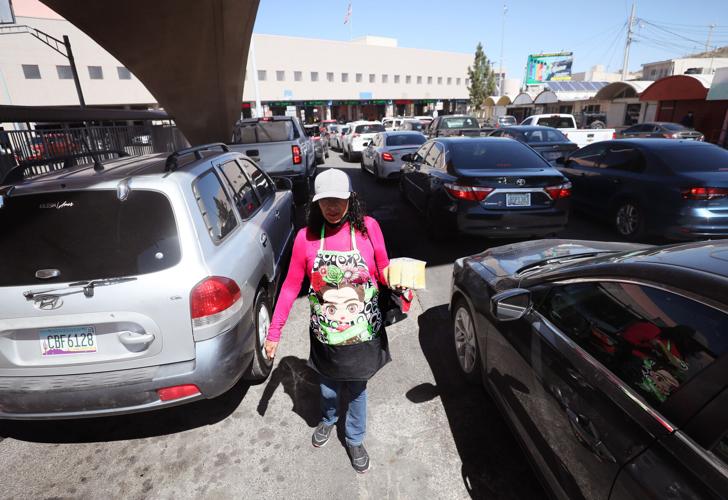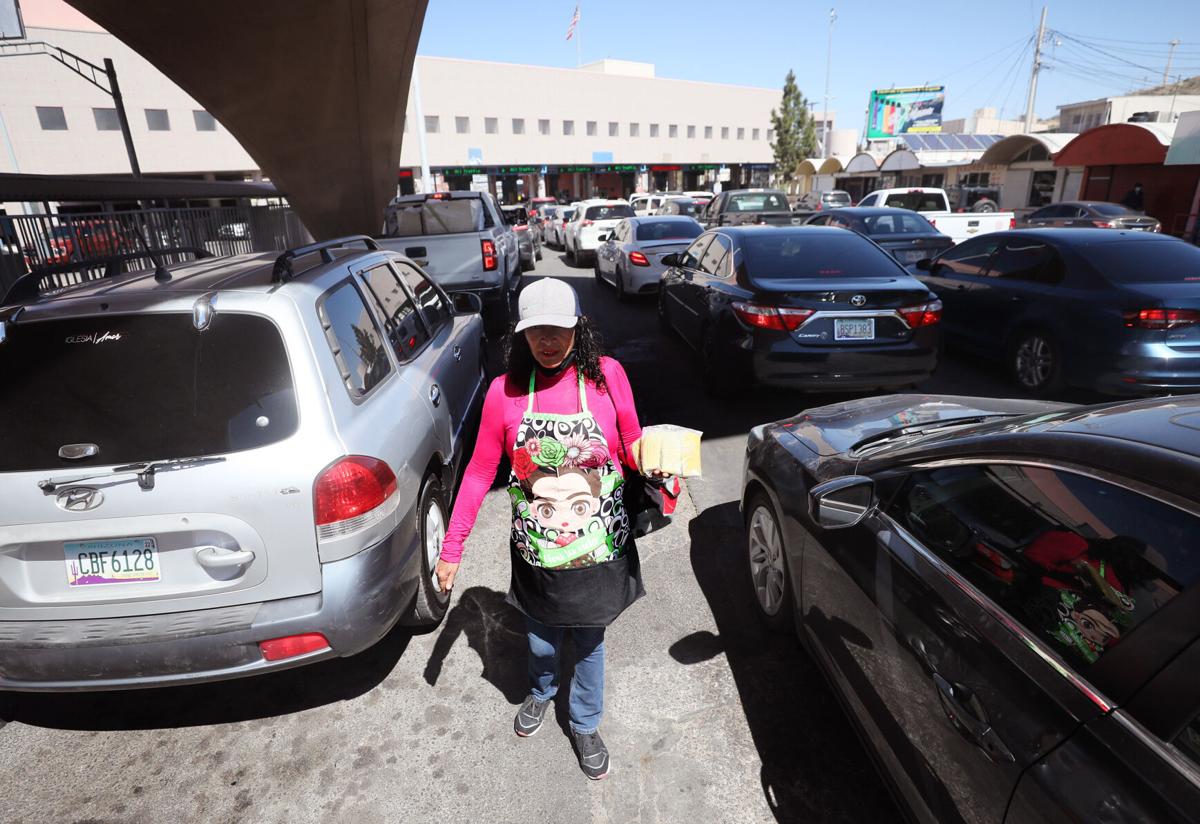The border traffic brings life-saving business to many families in Nogales, Sonora.
Maria Catalena Enriquez wakes up at 5:30 every morning to grind corn to make fresh tamales she will peddle to carloads of people waiting to cross into Arizona.
“Thanks to my tamalitos I have been able to move forward,” said Enriquez, known to her customers simply as Cathy. “I am very grateful to God that I have had the chance to make my tamales and not depend on anyone. What I get, I get how I can.”
By 7 a.m. she’s at the Nogales port of entry selling her tamales to the people waiting to drive over into Arizona. She sells sweet tamales and green chile and cheese tamales — a dozen at 150 pesos or $7.50 U.S. — each made fresh every day.
Another vendor’s family business sells plushies, hats, piggy banks and other trinkets along the road. Jaziel Cesar Perez works a booth near the car line with his family, toiling 10- to 12-hour days, six days a week, even under the blazing sun.
Perez’s family has a booth on the outskirts of the road, but they also carry trinkets through the line to try and sell to people waiting in their cars.
“People try to barter a lot,” Perez said. “They wouldn’t do that at a store or supermarket, but they barter with us, and obviously it bothers us.”
The exchange rate is about 19 pesos to a dollar, though it fluctuates.
“People always want everything cheaper,” said Diego Trujillo, who sells artisanal goods. He voiced a common issue among vendors. “Sometimes you just can’t give it to them or sometimes you’ll sell it to them just to have something in your bag.”
Another vendor, Luis Salazar, works for an ice cream company selling fresh fruit paletas, or popsicles. The company sells pineapple, coconut, rice, strawberry and chamoy popsicle sticks at 7 pesos, less than an American dollar, though sometimes people don’t have smaller change or have already spent their money on other vendors, he said.
Salazar can expect to make about 1,000 to 1,500 pesos in a four- to five-hour work day.

Vendors sell stuffed animals and wooden carvings to drivers waiting to cross into the United States from Nogales, Sonora.
“Most of the time you don’t get sales,” he said. “You could go through all the cars and not make any sales, but also one car could buy many popsicles.”
Aside from independent vendors like Enriquez and Perez and hourly employees like Salazar, there are also people who work on commission, like Enrique Ramirez, who works El Imparcial, distributing the newspaper.
Working seven-hour shifts every day, his goal is to sell 30 newspapers at 6 pesos apiece.
“Everyone here knows each other,” Ramirez said.
Vendor permits required
Antonio Martinez is an operative administrator of the General Directorate of Inspection and Surveillance, which gives vendors permits to sell their goods and services. Martinez walks around the border line checking the permits of the people he doesn’t recognize. He sees the same people almost every day, though.
There are no more permits being given in this area as it is “too saturated” already, Martinez said.

Luis Salazar sells fruit popsicles to drivers waiting to cross into the United States from Nogales, Sonora, on March 15. “Most of the time you don’t get sales,” he said. “You could go through all the cars and not make any sales, but also one car could buy many popsicles.”
“For everyone it’s just a job, and we try to get along,” he said. Most of the vendors have built a camaraderie, working more as co-workers at the line than as competitors.
Martinez works one of the two seven-hour shifts, usually with another inspector. He differentiates between vendors with valid permits to sell, people with no permits and people who beg for money.
“We can’t do more than (ask them to leave) because that would be abusing our authority,” Martinez said. Only if they refuse to leave does the inspector call the authorities.
Selling through the pandemic
At the height of the pandemic, people refused to lower their windows for any vendor.
For Trujillo, who sells artisanal goods, the pandemic meant two months of no work. He managed to get through it by using his savings, but he recalled there being “no jobs anywhere.”
Even now, he says, business has not bounced back.
In February of 2020, right before the pandemic, more than 800,000 travelers crossed through the Nogales ports of entry. In February 2021, the number was slightly less than half that, according to U.S. Customs and Border Protection data. It was nearly 750,000 travelers in February.
Enriquez, the tamal maker, says she would return home with dozens of tamales, chalking them up as losses because of her baked-fresh philosophy.
Enriquez uses the money she earns to pay for her water and electricity bills, for food, and for doctor visits for her husband, who has 70% of the arteries to his legs blocked because of diabetes, she says. During the pandemic, her grown daughter also got extremely sick, and Enriquez had to pay for the hospital expenses as well as helping to keep her other adult daughter afloat, too.
“With the pandemic, we had many lows,” Enriquez said. “But even still, we stayed here those two years with the few people that passed from the U.S.”
Enriquez recalls that people would bring over food from community food banks in the U.S. — milk gallons, cereal and other food that helped sustain her family. Someone even donated 10,000 pesos to her, the equivalent of about $500, without even buying her tamales.

Vendors sell everything from food to Christian iconography to drivers waiting to cross into the United States.
“In reality, on the other side, people help out the Mexican (people),” Enriquez said of many of the Americans she encounters.
“I live through my tamales,” Enriquez said. “I’m very happy selling them and having people support me through buying them. I’m working, not begging.”
Photos: Nogales road trip in 1956
Roadtrip to Nogales
Updated
Driving on south on Old Nogales Highway in July, 1956. Don't do this at home. Photo by Preston Yeager / Tucson Citizen
Roadtrip to Nogales
Updated
Highway sign on Old Nogales Highway south of Tucson in July, 1956. Photo by Preston Yeager / Tucson Citizen
Roadtrip to Nogales
Updated
Sign warming of dangers on Old Nogales Highway south of Tucson in July, 1956. Photo by Preston Yeager / Tucson Citizen
Roadtrip to Nogales
Updated
Old Nogales Highway at night, approaching Sahuarita in July, 1956. Don't blink. Photo by Preston Yeager / Tucson Citizen
Roadtrip to Nogales
Updated
Nogales, Sonora, bars in July, 1956. Photo by Preston Yeager / Tucson Citizen
Roadtrip to Nogales
Updated
Nogales, Sonora, bars in July, 1956. Photo by Preston Yeager / Tucson Citizen
Roadtrip to Nogales
Updated
Moody beer bottles and glasses in a Nogales, Sonora, bar in July, 1956. Photo by Preston Yeager / Tucson Citizen
Roadtrip to Nogales
Updated
Dancing at a bar in Nogales, Sonora, in July, 1956. Photo by Preston Yeager / Tucson Citizen
Roadtrip to Nogales
Updated
A bartender in Nogales, Sonora, pours salt on his hand prior to a shot of tequila in July, 1956. Photo by Preston Yeager / Tucson Citizen
Roadtrip to Nogales
Updated
Old Nogales Highway in July, 1956. Martha, are we near Mexico? Photo by Preston Yeager / Tucson Citizen
Roadtrip to Nogales
Updated
Old Nogales Highway near Ruby Road in July, 1956. Photo by Preston Yeager / Tucson Citizen
Roadtrip to Nogales
Updated
Old Nogales Highway in July, 1956. Watch out for the highway patrol. Photo by Preston Yeager / Tucson Citizen







